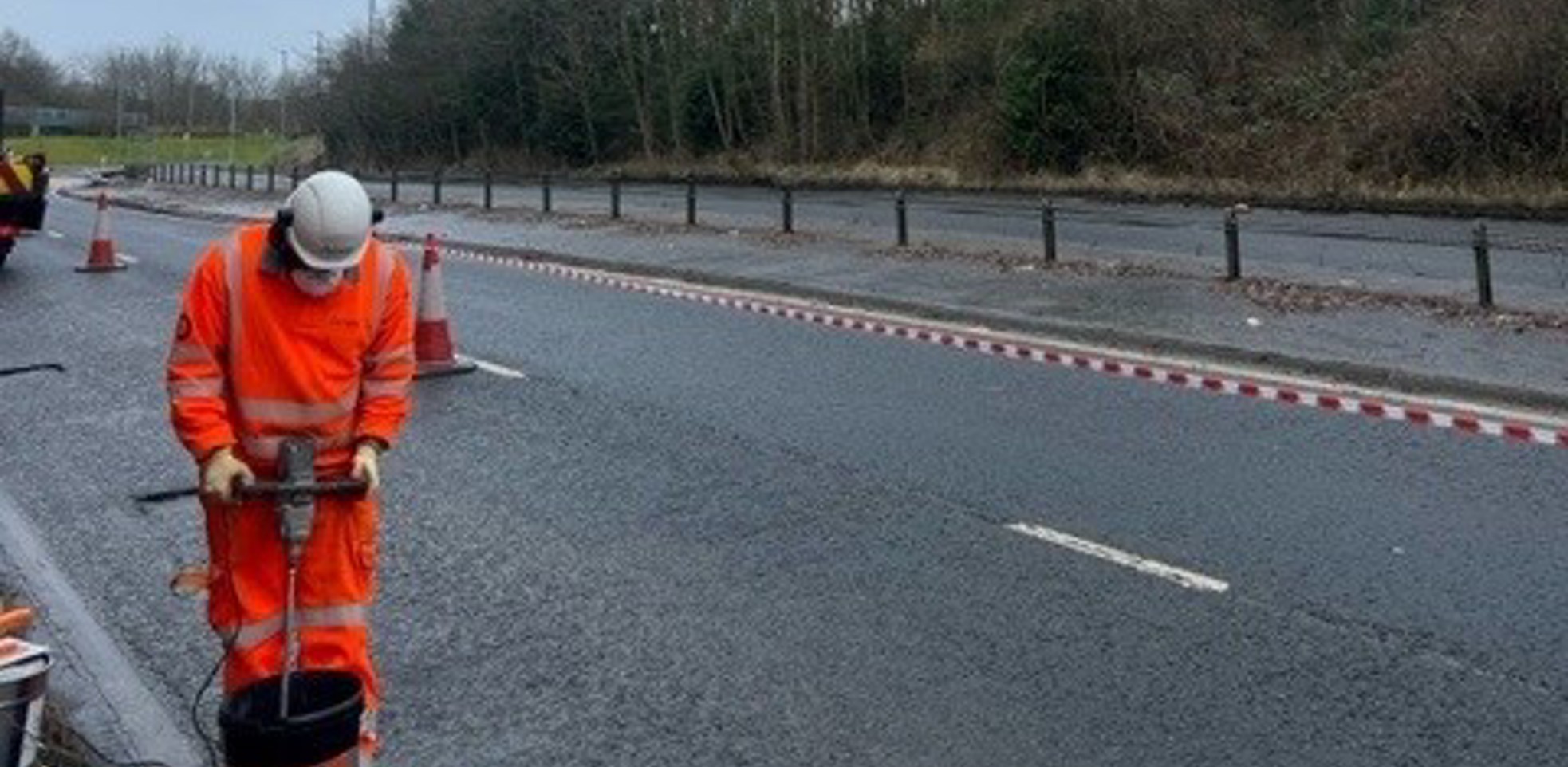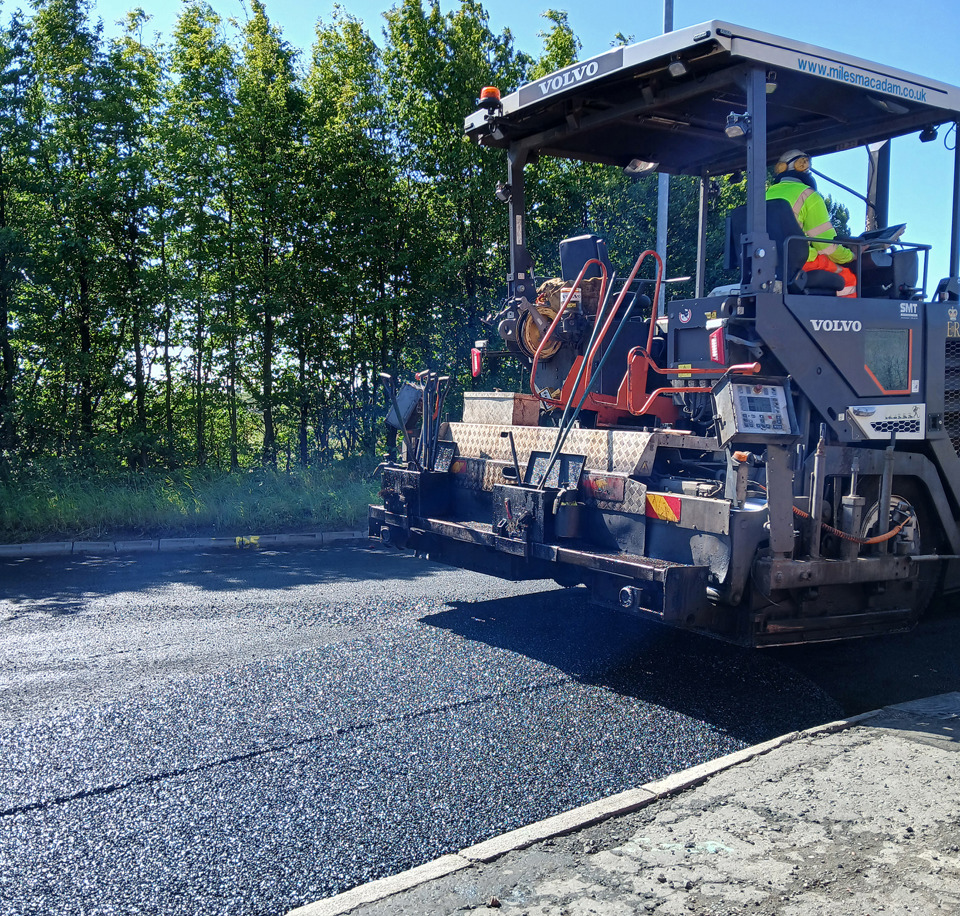Tagged in:
First live trials for Live Labs 2 Centre of Excellence for Decarbonising Roads
And they're off! The live trials of the Centre have officially started. Read more about this exciting milestone in developing the roadmap to decarbonisation of local roads.

A Department for Transport (DfT) UK-wide funded programme has reached a key milestone with the first live trials taking place in North Lanarkshire, Scotland and in the West Midlands region – including Coventry, Dudley, Sandwell, Walsall and Wolverhampton.
ADEPT Live Labs 2: Decarbonising Local Roads in the UK is a three-year, UK-wide £30 million programme, funded by the Department for Transport that aims to decarbonise the local highway network. Live Labs 2 includes seven projects, grouped by four interconnected themes, led by local authorities working alongside commercial and academic partners.
One of the four Live Labs 2 themes – The Centre of Excellence for Decarbonising Roads - identifies leading road materials innovations, provides a centralised hub for live trialling and evaluation, develops a knowledge bank and virtual collaboration environment, and enables a process to share and disseminate learnings at pace.
Working as a collaborative partnership, North Lanarkshire Council (NLC) and Transport for the West Midlands (TfWM) are working with Amey and Colas to achieve the objectives for the Centre of Excellence for Decarbonising Roads programme, and are drawing on a vast combined network of national and international partners to gain insights and trial leading innovation to tackle one of the largest challenges facing the UK roads sector.
The Centre of Excellence theme is split into the north and south campuses, combining research across the two geographic locations, and working with key partners to identify game-changing low-carbon innovations.
The first set of Live Labs’ trials include repair and solutions and products from a wide range of partners, including FM Conway, Degafloor, Roadmender, Colas, Meon, Multevo, Instarmac, Viafix, Roadtechs, Velocity, Tarmac, LCM (Low Carbon Materials), JCB Pothole Pro and Thermal Road Repairs. These materials, identified through an innovation funnel and expert evaluation process, show high potential as low-carbon solutions.
The teams repaired a total of circa 100 potholes using these materials, comparing their carbon footprint and technical performance against existing reference solutions. Across the two campuses, a combination of excavated and infill potholes were repaired across 30 trial sites. Suppliers demonstrated the application of these materials to operational teams, providing crucial insights into their effectiveness in a live environment.
Mark Corbin, Senior Responsible Owner for The Centre of Excellence for Decarbonising Roads South Campus and Transport for West Midland’s Director of Network Resilience said: “The Centre of Excellence for Decarbonising Roads programme represents a significant step forward in our collective efforts to tackle the climate crisis. Through these trials, we are pushing the boundaries of road materials innovation and paving the way for a greener, more sustainable future. I am proud to be part of this collaborative initiative and excited to witness the positive impact it will have on decarbonising our roads.
“The Live Labs 2 programme is a key driver in our mission to create a more sustainable and resilient local highway network. These trials are a crucial milestone in our journey to achieving this. By leveraging the expertise of our partners and exploring cutting-edge materials and technologies, we are demonstrating our commitment towards a low-carbon future for our roads. I am confident that the outcomes of these trials will pave the way for transformative change in our sector.”
Councillor Kenneth Stevenson, Convener of the Communities Committee at North Lanarkshire Council added: “This is an exciting development for the UK Centre of Excellence for Decarbonising Roads as we carry out the first trials of low carbon materials that could be used for repairing potholes.
“We are very pleased with the response to our appeal for innovative materials that could help decarbonise the UK road network and achieve net-zero targets, and these trials are the first time we can put new materials and methods to the test. I look forward to seeing the outcomes and sharing these with the industry.”
Highways Sector Director at Amey, Andy Denman said: “Reducing our carbon footprint and improving sustainability are critical success factors for many organisations and we at Amey are delighted to be working closely with our client, North Lanarkshire Council to deliver these innovative trials in Scotland and address these challenges.
“We have worked with the sector bodies and programme partners to build the Centre of Excellence, bringing knowledge and expertise together to transform our carbon and climate change ambitions and put them into real actions. We’re excited to see the progress over the next few months and how this may shape our sector for the better.”
Daniel Morgan, Colas’ Executive Director for Products & Surfacing Solutions said: “The Centre of Excellence for Decarbonising Roads programme is an unprecedented opportunity to drive innovation for the benefit of the sector. We are excited to be working in a collaborative way with partners, bringing our expertise to identify game-changing low-carbon solutions. Through these trials, we aim to transform the industry and pave the way for a sustainable and decarbonised road network.
“These trials represent an exciting step forward in our efforts to achieve our decarbonisation goals, they create the opportunity to explore innovative materials and repair solutions that have the potential to significantly reduce carbon emissions. We look forward to the outcome of these trials and the positive impact they will have for the highways sector.”
The programme will continue to rigorously test, monitor, and evaluate the performance of the materials in partnership with the Expert Research Group, comprised of leading pavement and carbon researchers from University of Nottingham, Aston University and the Future Highways Research Group. A case study and findings will be published in the coming months to drive sustainable innovations that transform local roads, while contributing to the UK’s net-zero carbon goals.
Both sets of campus results will now be compiled and compared to determine best practice and any geographical differences in lowering the carbon footprint of this service activity.
To find out more and stay updated with the latest progress at the Centre of Excellence for Decarbonising roads, subscribe for updates www.decarbonisingroads.co.uk and follow CEDR’s LinkedIn page.
ADEPT represents local authority county, unitary and metropolitan directors across England. Each project is testing new solutions to decarbonise construction, operations and maintenance across the whole life cycle of the local highway network. The programme is overseen by an independent Commissioning Board, which includes DfT and other experts from across the public and private sectors.
For more information about the Live Labs 2 programme, visit www.adeptnet.org.uk/livelabs2
Other Articles
View all Articles View Article
View Article
Q3 Reflection - Quarterly Newsletter 2025
Read our quarterly newsletter below, with updates from recent trials, events and local authority best practice.
 View Article
View Article
STEM Workshops with Routes to Work
Celebrating Green Careers Week with STEM Workshops at Routes to Work
 View Article
View Article
Q2 Reflection - Quarterly Newsletter 2025
Read our quarterly newsletter below, with updates from recent trials, events and local authority best practice.

Comments